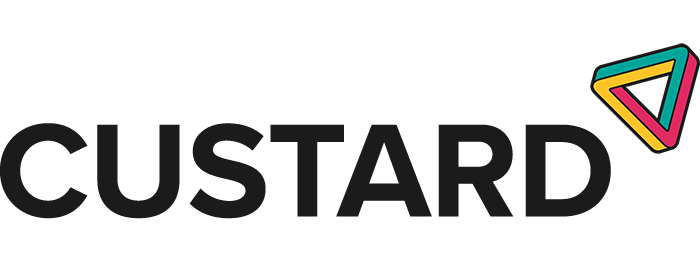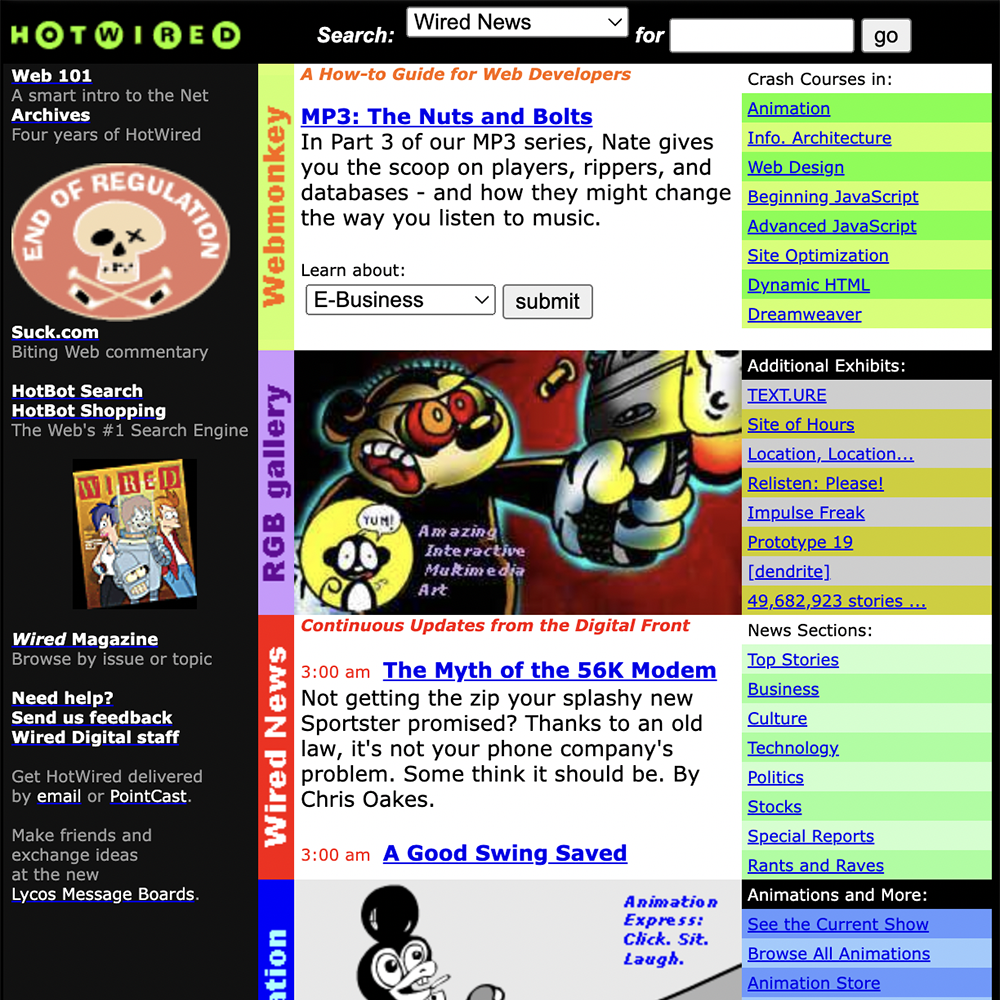
Search engines are used so frequently that their origins can oftentimes be forgotten about. Both search engines and the term digital marketing have existed since the 1990s, so it comes as no surprise that they have transformed so vastly since then! Let’s take a look at the history of search engines, from inception until the present day.
A brief moment in time: The last thirty years of search engines
Even though the web was available from the 1990s, the first search engine became available in 1993. Thirty years on, Google is undeniably the most dominant search engine. However, Google wasn’t even launched by Larry Page and Sergey Brin until 1998 – this means there were 5 entire years of search engine development before Google took off.
Within these 5 years, the true crooks of what makes a search engine a search engine were set in stone, and this left a clear path for Google to follow.
WebCrawler
Whilst Aliweb was actually the first search engine, WebCrawler is generally considered the first search engine.
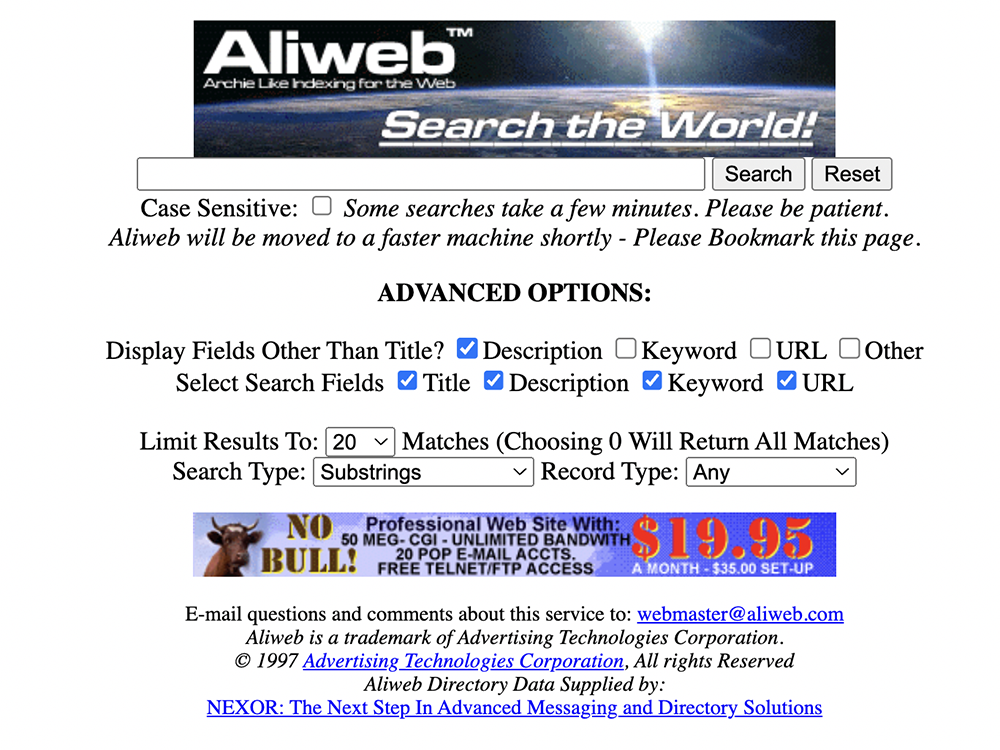
Screenshot of Aliweb search engine homepage, circa 1998
Aliweb allowed users to submit the locations of index files on their sites, meaning they could be stored on the search engine. The reason why WebCrawler is often deemed as, or remembered as the first search engine, is because Aliweb didn’t have many users register their sites, hence its use was extremely small in comparison to that of WebCrawler.

Screenshot of Webcrawler search engine homepage, circa 1999
For context, WebCrawler was the second most visited website on the internet in February 1996! Their popularity slowly started to dim when Yahoo! and other search engines emerged.
Lycos and AltaVista
In 1994, two other search engines emerged – Lycos and AltaVista. Specifically, these were significant search engines as they utilised crawling techniques to index websites; this gave users a much more refined search and therefore boosted popularity.
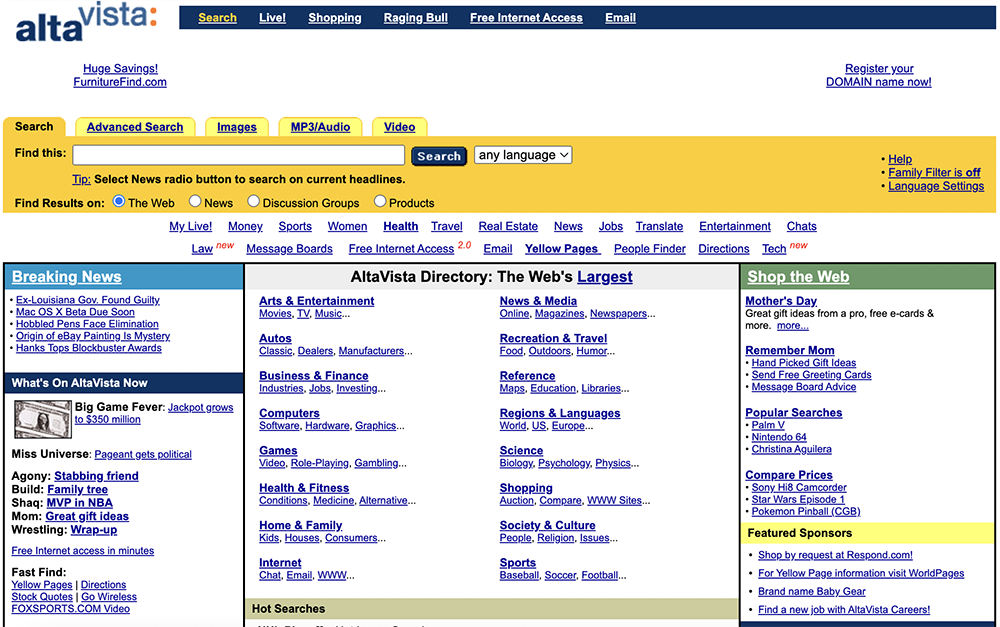
Screenshot of Altavista search engine homepage, circa 2000
It wasn’t only search engines that were becoming more popular. In the same year, the first clickable web-ad banners appeared on Wired magazine’s website hotwired.com on October 27, 1994, hence digital marketing was starting to take off, too. These advancements were really forming the technological space.

Screenshot of Hotwired homepage, circa 1997
In 1998, Google was launched and history was changed, forever. Google was mostly revolutionary due to its PageRank algorithm meaning information on web pages wasn’t only found, but that a page’s popularity could be dictated too.
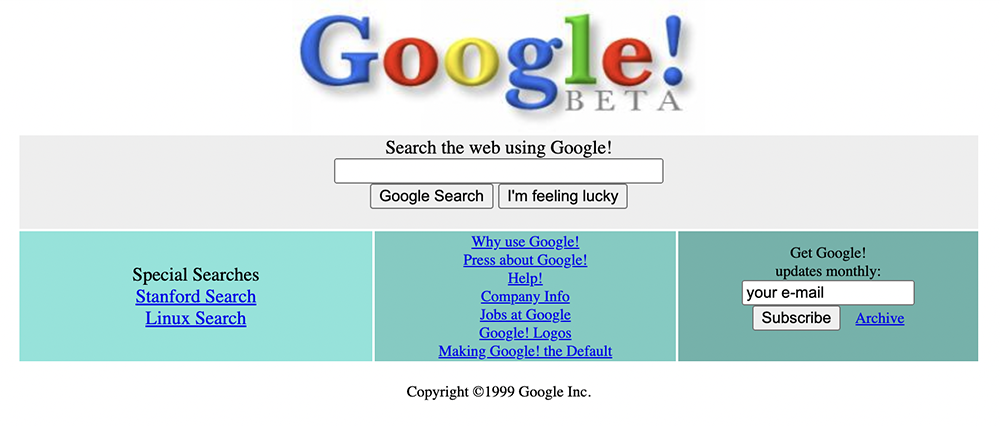
Screenshot of Google search engine’s beta homepage, circa 2000
Google utilised crawling via Googlebot, which frequently visited pages to ensure that the index was up to date, making Google one of a kind. Ever since then, any competitors have simply been in the shadows of Google’s gigantic status.
But, how has Google been able to stay as influential as it has? To put it simply, Google has managed to constantly stay on top of the seemingly insurmountable pace of technological updates.
Considering Android OS, developed by Google, this software only further highlights Google’s capabilities in the technological space. Android OS can be linked to phones, which can then be linked to other Google products like Gmail, Google Pay and cloud storage. This chain of links means that Google can compile enough information about a cohort to dictate, for example, what age groups are more likely to go where, and at what time.
In other words, Google has the capability to have an omniscient view of modern technological life, its trends, trials, and tribulations. Due to this, finding a competitor with a scope even close to Google’s would prove extremely hard.

Screenshot of contemporary Google SERP, 15/08/2023
Organic search and its capabilities: SERPs
Why did the chicken cross the road from the 2nd page to the 1st page of SERPs? It heard there were better cluck-through rates there!
Seriously though, a website’s position on the search engine results page (SERP), which is determined by organic search, will determine how ‘successful’ your website will perform.
Organic search in a nutshell is the unpaid listings that appear on the search engine results page. Your ranking via organic search is determined by a few factors such as search engine optimisation (SEO), the discoverability of the site, domain authority (meaning how popular your website’s brand is), and the relevance to the user’s search query.
Think about the last time you searched something up. Did you have to venture as far as the second page of Google? Probably not. Results are so accessible that, a lot of the time, a search query will be answered on the first page. This means that key metrics of websites such as click-through rate are seriously impacted.
Organic search seriously opens up the capabilities for users to find information due to organic search’s versatility. Organic search results can come in a variety of forms such as featured snippets, People Also Ask, images, or even ads for Google Shopping – just to name a few.
This versatility means that organic search results’ click-through rate (CTR), according to SparkToro, is nearly ten times higher than paid search!
So, how do you write SEO optimised content that will be sure to rank high on SERPs? As mentioned, there are three concepts crucial to keep in mind, if you want to boost your SERP ranking.
Discoverability
One of the best ways to improve the discoverability of your website is to utilise internal linking. This ensures that Google can find links between your content, and understand that this content is related.
Relevancy
To achieve maximum relevancy for your desired user’s search query, make sure that the page’s layout and content structure is consistent with the user’s search intent (i.e. what they are looking to achieve with that particular search session). It’s also essential that you do your keyword research properly so you know exactly what keywords this page is targeted at.
Authority
Whilst authority may seem trickier to increase, ensuring you have high-quality off-site signals, such as backlinks, notifies Google that you have noteworthy content. Also, ensure you audit your site’s backlink profile and remove any potentially toxic bad links. Producing original, high quality content means that when users click through to your site from elsewhere, they find your content informative and helpful, which increases time on site and reduces bounces – thereby helping to reinforce your site’s position as an authority on the topic.
Organic search and its capabilities: Monetisation
Whilst the concept of monetisation may seem contradictory in direct relation to organic search due to organic search’s cost-free nature, they are actually not contradictory. This is because the website owner will oftentimes monetise their own website to create spaces for advertisers to, well, advertise.
Therefore, if a business wants to cross the road over to the 1st page of Google’s SERPs, it may invest in selling space to ensure it can increase its reach.
Organic search and its selling spaces are such a valuable market today due to the sheer reach of organic search. In 2020 Google accumulated over 1.2 trillion searches, averaging 80,000 Google searches, every, single, second.
These stats alone show how profitable organic search and its monetisation really are due to the sheer number of people it enables your content to reach.
SEO, search engines and strategies
The relationship between SEO and search engine algorithms is a complex, ever-changing one. SEOs constantly have to adapt their approach to ensure they can keep pace with search engines. Creating compelling, informative and high-ranking content is challenging, yet also crucial to the success of your business.
At a Manchester SEO agency like Custard, content optimised for SEO is just one of our specialities. If you’d like more information about outsourcing your business’ SEO content writing, don’t hesitate to get in touch with our specialist SEO content writing agency today.
It’s important to consider the evolution of algorithms, to understand how this will have impacted SEO too. Algorithms used to be much more simplistic than they are now, and they were mainly focused on keyword density and backlinks. These factors were easily abused by unscrupulous webmasters in aggressive pursuit of better rankings, which meant that search engines had to find new factors which were harder to fake. This naturally led to the incorporation of user experience, website speed and mobile friendliness into the core algorithm, which means if your site isn’t up to scratch from a technical point of view, the content itself might not even matter. (For more information on technical SEO Manchester and how we can help you get your house in order, request a call back from one of our experts.)
The largest shift in the SEO’s relationship with search engines in recent years is a pivot to focus on real user experience (UX, for short). To improve user experience, a wide range of tactics must be employed, ranging from optimising navigation structures, ensuring excellent cross-platform functionality between desktop/mobile browsing formats, maximising content quality to make the information on your site better than can be found on competing sites, and improving website speed to deliver a snappy feel to an increasingly impatient and unforgiving audience.
Putting UX first will be sure to improve SERP performance.
Changes to the core ranking algorithm are only going to become more and more frequent due to the rise of artificial intelligence. For example, Google has an AI tool called RankBrain which analyses various factors like behaviour and content quality. Keeping on top of AI trends is a useful skill to have, to ensure that you can be flexible when new technological advances emerge.
Such changes are already frequent with updates happening every few months, so it is crucial to keep up with the trends and relationship between SEO and algorithms. Now more than ever, it is important to keep your SEO strategy flexible with a specialist content strategy agency, so you can adapt accordingly.
AI And Future Trends
Whilst it has been acknowledged that AI will ultimately impact the relationship between SEO and algorithms, there is still the general question of how AI will impact Google’s dominance generally, and whether AI can pose a threat to Google.
Some emergent AI tools offer users a more streamlined means of achieving the same end goal as a Google search. Take ChatGPT as an example – you can ask it a question or give it some kind of prompt, and it’ll seemingly give you a single, definitive answer, which is arguably simpler than being presented with a list of websites, each of which offers its own set of potential answers. The issue then becomes whether or not the answer given by ChatGPT is truly THE answer to your question.
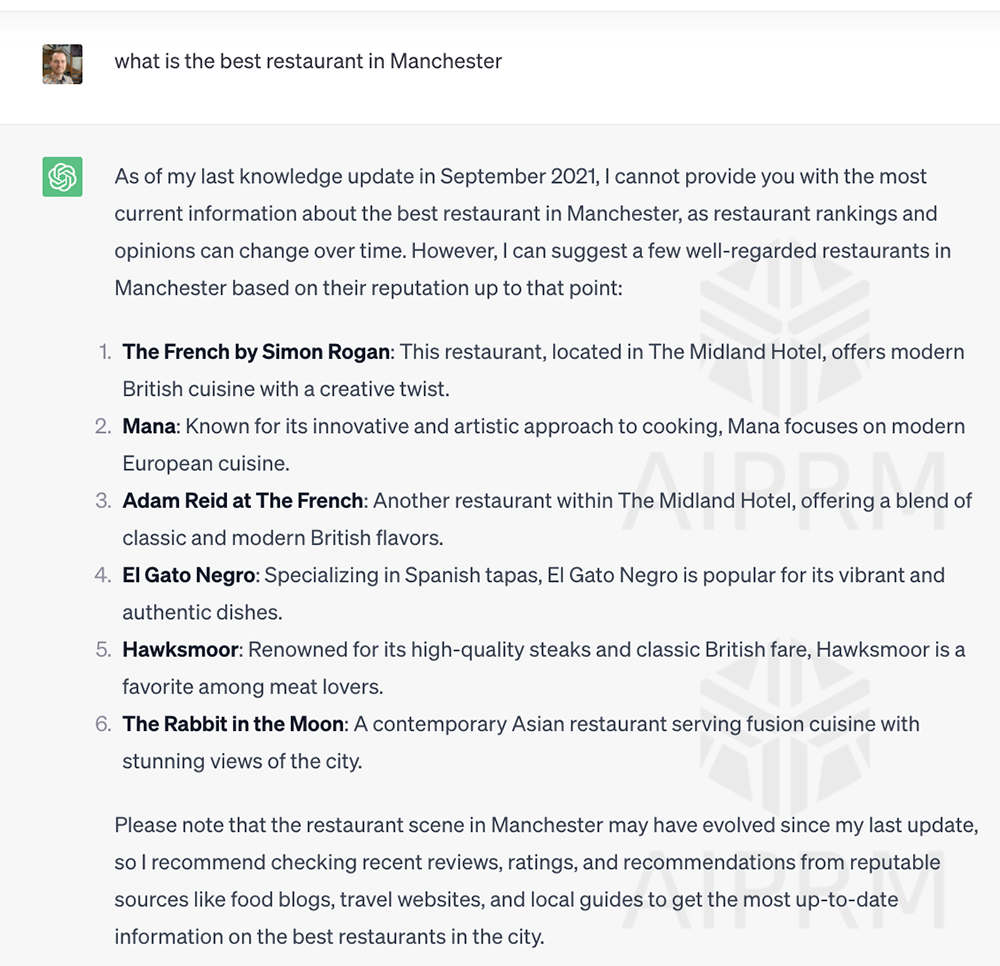
ChatGPT’s opinion on the topic of ‘best restaurant in Manchester’ – but only as of September 2021
But, whilst there are some similarities between Google’s core function and such tools, it must be remembered that Google isn’t just a search engine. Google is also your email, calendar, map, and advertising platform. In other words, ChatGPT is an extra tool, whilst Google acts as a foundation for all manner of requirements. AI tools may develop some of these capabilities over time, but it will be a while before Google could be supplanted in its entirety.
Undeniably, ChatGPT is an impressive tool, however, another rather large flaw within its capabilities is that its access to information is time limited with a cut off (at time of writing) of September 2021, meaning it cannot currently keep pace with Google’s ability to constantly change.
In summary, if certain aspects of AI were to change then it could pose a real threat to Google, however there are some clear shortfalls within the feature set of current AI tools and specifically ChatGPT meaning that Google’s position as the market leader seems safe, for now at least.
That’s the history of search engines and that’s only 30 years! Where search engines will go next specifically is uncertain – however, drastic changes are sure to be prevalent.
